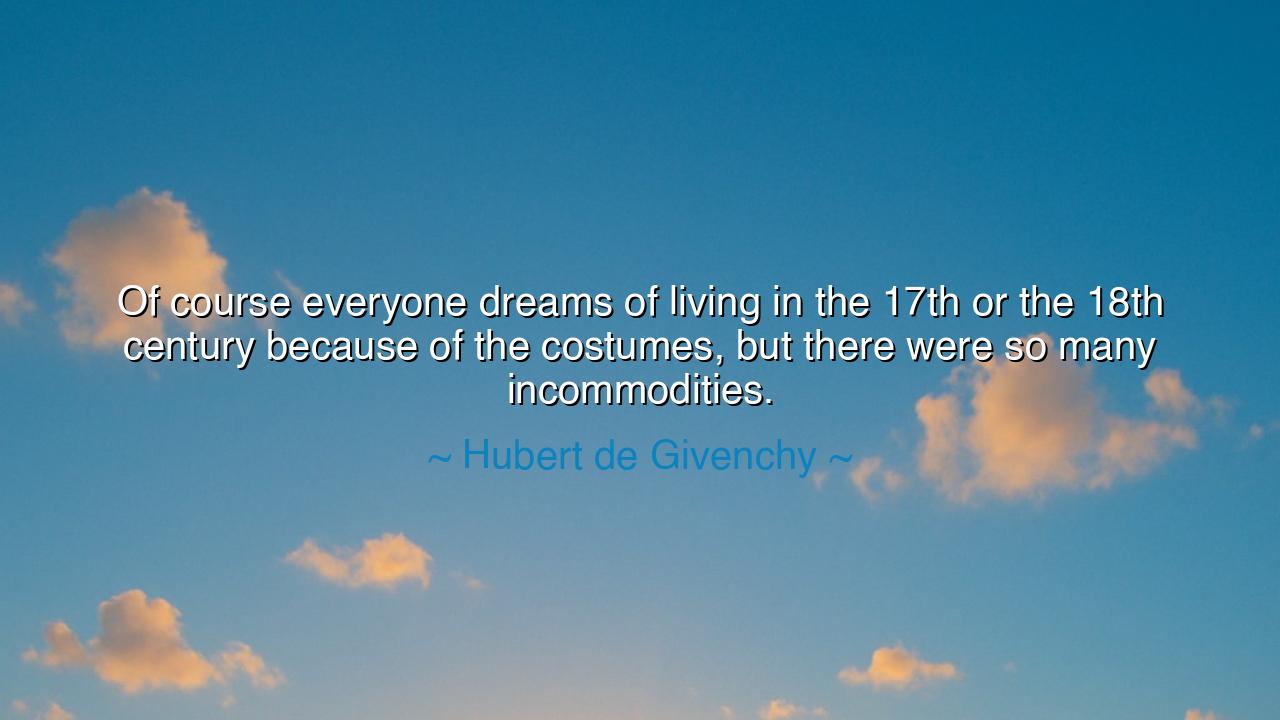
Of course everyone dreams of living in the 17th or the 18th
Of course everyone dreams of living in the 17th or the 18th century because of the costumes, but there were so many incommodities.






“Of course everyone dreams of living in the 17th or the 18th century because of the costumes, but there were so many incommodities.” — Hubert de Givenchy
Hear now, O lovers of beauty and seekers of elegance, the words of Hubert de Givenchy, the master of grace, the weaver of dreams in silk and light. In this saying, he speaks not merely of fashion, but of the eternal illusion of nostalgia—that tender yet dangerous yearning for a past gilded by imagination. For though the heart may long for the elegance of powdered wigs, the sweep of velvet gowns, and the poise of candlelit courts, Givenchy reminds us that every age bears its own burdens, its hidden incommodities, unseen by those who look backward through the rosy veil of fantasy.
In his time, Givenchy clothed queens of modernity—Audrey Hepburn, Jacqueline Kennedy, and others who carried the torch of refinement into a world of speed and steel. Yet even he, a man who understood beauty’s power, knew that it must never be confused with comfort, nor aesthetics with life itself. The 17th and 18th centuries, to which he alludes, shimmer in our collective memory as an age of courtly grandeur—Versailles, Vienna, the salons of Paris. But beneath the lace and perfume, those centuries were also filled with hardship: the stench of streets unwashed, the cold chambers of winter palaces, the tyranny of disease and class. The candlelight that glowed so romantically also burned with smoke and soot. Thus he teaches us: to dream of the past is easy; to live in it would have been another matter entirely.
Consider, if you will, the tale of Marie Antoinette, that tragic queen whose image still enchants the world. Draped in silk, crowned with diamonds, she seemed to live in a paradise of elegance. Yet behind the jeweled façade lay a prison of ceremony and surveillance, where every gesture was prescribed, every joy scrutinized. Even her beauty could not save her from the blade of revolution. The costumes that delight us now were, in truth, cages woven of expectation and excess. Such is the wisdom behind Givenchy’s words: that beauty without balance becomes burden, and luxury without freedom is no paradise at all.
The fashion designer, standing at the crossroads of art and reality, knows this truth better than most. He creates dreams, yes—but he also creates garments to be worn by living bodies. And life, as he reminds us, is filled with movement, with imperfection, with the need for comfort, both physical and spiritual. What he called “incommodities” were not merely the lack of plumbing or the chill of stone walls—they were the restrictions of living for appearances alone. To dream of those centuries is to admire their beauty; to live like them is to forget that progress, too, is a form of grace.
In his quiet wisdom, Givenchy’s words carry a deeper teaching: that modernity, for all its noise and haste, has given us something priceless—the freedom to blend beauty with ease, elegance with simplicity, art with authenticity. We are no longer bound by the corset of conformity. We can create our own style, our own rhythm, our own truth. The modern soul must not scorn the past, but learn from it—to preserve its artistry, yet abandon its discomforts; to inherit its spirit, but not its chains.
So, my children of the present age, do not chase the phantoms of history thinking they will bring you peace. Do not mistake the shimmer of bygone silk for the light of happiness. Instead, learn to find splendor in the now—to craft beauty that breathes, to honor elegance that serves life rather than stifles it. Let the dream of the 18th century inspire your imagination, but let the wisdom of your own time guide your hands.
For the lesson is this: nostalgia is a perfume sweet to smell, but deadly to drink. Admire the costumes of the past, but cherish the comforts of the present. Seek beauty, yes—but let it live, let it move, let it serve. As Givenchy himself proved, true elegance is not in the century we dream of, but in how we carry ourselves through the century we are given. Live with grace in your own time, and history itself will look back on you with wonder.






AAdministratorAdministrator
Welcome, honored guests. Please leave a comment, we will respond soon